Key takeaways:
- Decision-making in politics has profound consequences, as even small choices can significantly impact public trust and community morale.
- Effective decision-making models, such as rational choice theory and collaborative approaches, enhance political discourse and inclusivity.
- Emotional intuition often plays a crucial role in political decisions, highlighting the importance of balancing data with human experiences.
- Open dialogue and collaboration among diverse stakeholders can strengthen democratic engagement and lead to more informed choices.
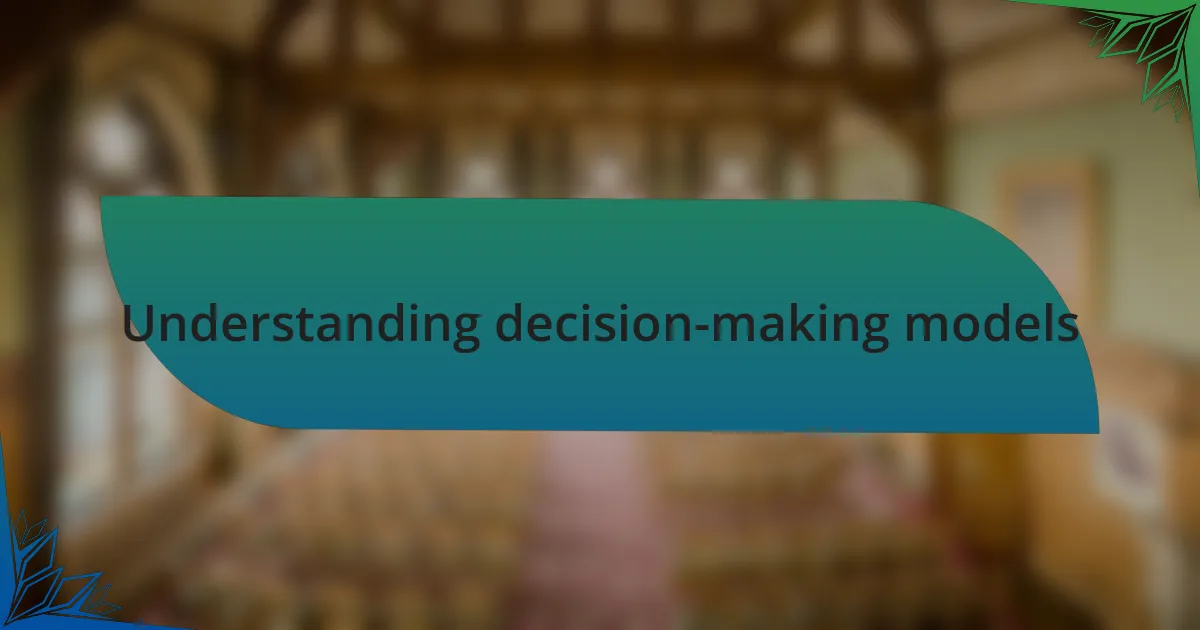
Understanding decision-making models
Understanding decision-making models is essential for navigating complex scenarios, especially in political realms. These models, like rational choice theory and the garbage can model, offer frameworks that help us decode the often messy process of making choices. I remember grappling with a significant decision during a local campaign, where the pressure made me wonder: should I rely on my gut feeling or analyze data meticulously?
Rational choice theory, one of the most recognized decision-making models, suggests that individuals make decisions by weighing their options based on perceived benefits and costs. In practice, I found myself doing just that when choosing between two candidates; I listed pros and cons, only to realize that emotions and public sentiment played a significant role in my final decision. Have you experienced a moment when logic took a backseat to intuition?
On the other hand, the garbage can model portrays decision-making as chaotic, emphasizing the randomness of factors involved. Reflecting on times when I was part of a community board, the disorganization often felt overwhelming, yet insightful. This model reminds me that sometimes, the best decisions arise from the chaos, turning unexpected challenges into opportunities for growth. How do you view the balance between structure and spontaneity in your choices?
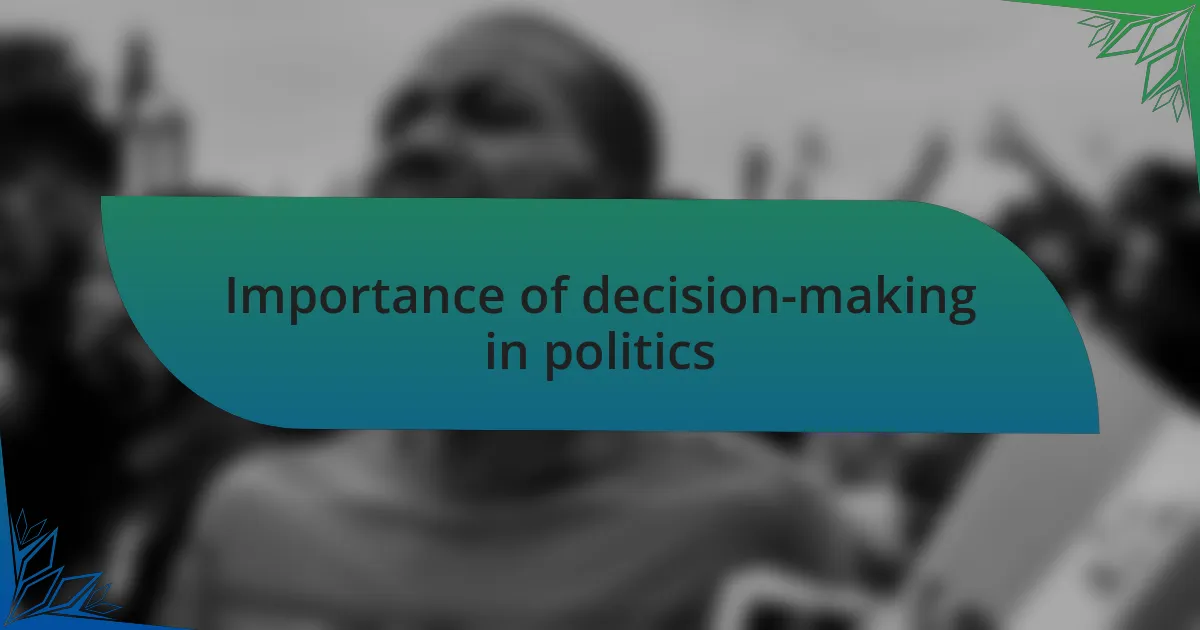
Importance of decision-making in politics
Decision-making in politics holds immense significance, as the consequences can ripple across communities and nations. I recall the aftermath of a legislative decision that seemed trivial at first but later led to significant social unrest. It made me appreciate how even small choices can have profound effects; public trust hinges on the belief that leaders are making informed and thoughtful decisions. What happens when that trust is broken?
Moreover, the ability to make sound decisions often dictates the success or failure of political leaders. During my time volunteering for a campaign, I witnessed how crucial timely and decisive action could be. Delays in responding to pressing issues led to missed opportunities that, in hindsight, could have altered the campaign’s trajectory. Have you ever noticed how hesitation can sometimes be as damaging as a wrong choice?
Finally, effective decision-making can foster collaboration and consensus among diverse stakeholders. In a town hall meeting I attended, leaders who approached their decisions transparently were able to bridge divides. This taught me that involving constituents in the decision-making process not only enhances legitimacy but also empowers citizens, creating a healthier political landscape. Isn’t that what we all desire—a system where everyone feels heard and valued?
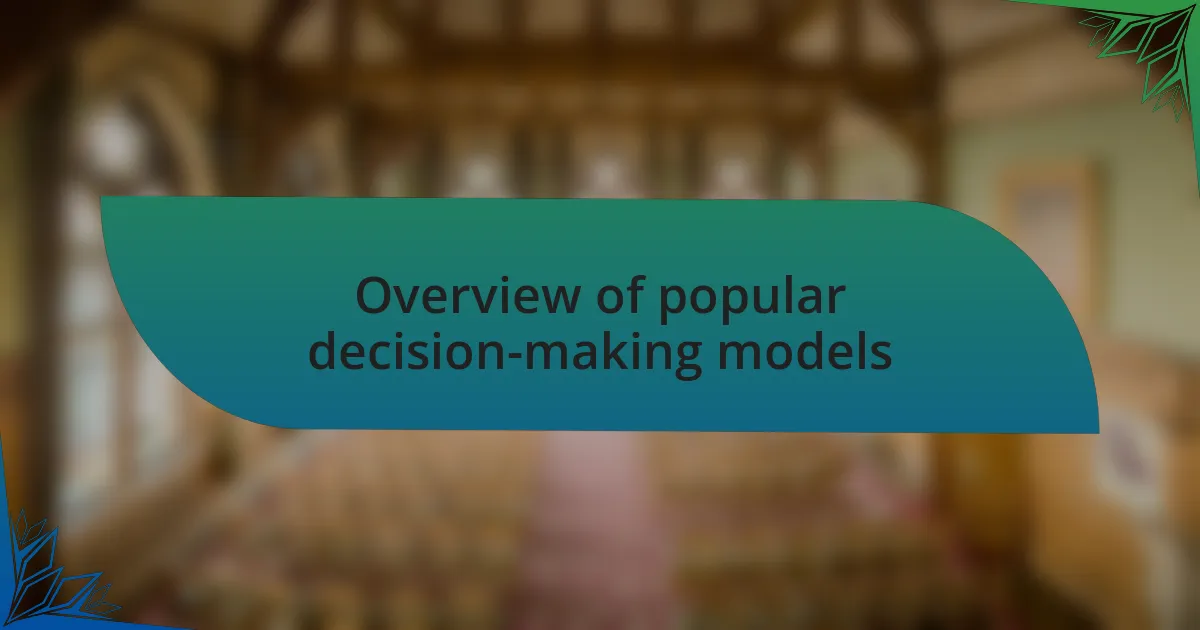
Overview of popular decision-making models
Decision-making models are essential tools that help individuals and groups navigate complex political landscapes. The rational decision-making model stands out for its systematic approach, emphasizing data-driven choices. I remember a debate I had with a colleague about a policy proposal; we relied on this model to analyze potential outcomes and make a strong case, which highlighted how structured thinking can enhance political discourse.
Another model worth mentioning is the intuitive decision-making model, where decisions are made based on gut feelings or experiences rather than a thorough analysis. I’ve seen this model come into play during urgent political crises, where time is of the essence. In one instance, a politician I worked with had to decide quickly on an urgent matter, relying on instincts honed from years of public service. It was a reminder that our intuition often speaks volumes, particularly when stakes are high.
Lastly, the collaborative model invites diverse perspectives into the decision-making process, promoting inclusivity and shared ownership. I’ve facilitated meetings where stakeholders from different sectors contributed their views on a contentious issue. Seeing these varied insights weave together into a more rounded decision made me realize that the true strength of politics lies in our ability to listen to one another—don’t you think that collaboration can lead to more comprehensive solutions?
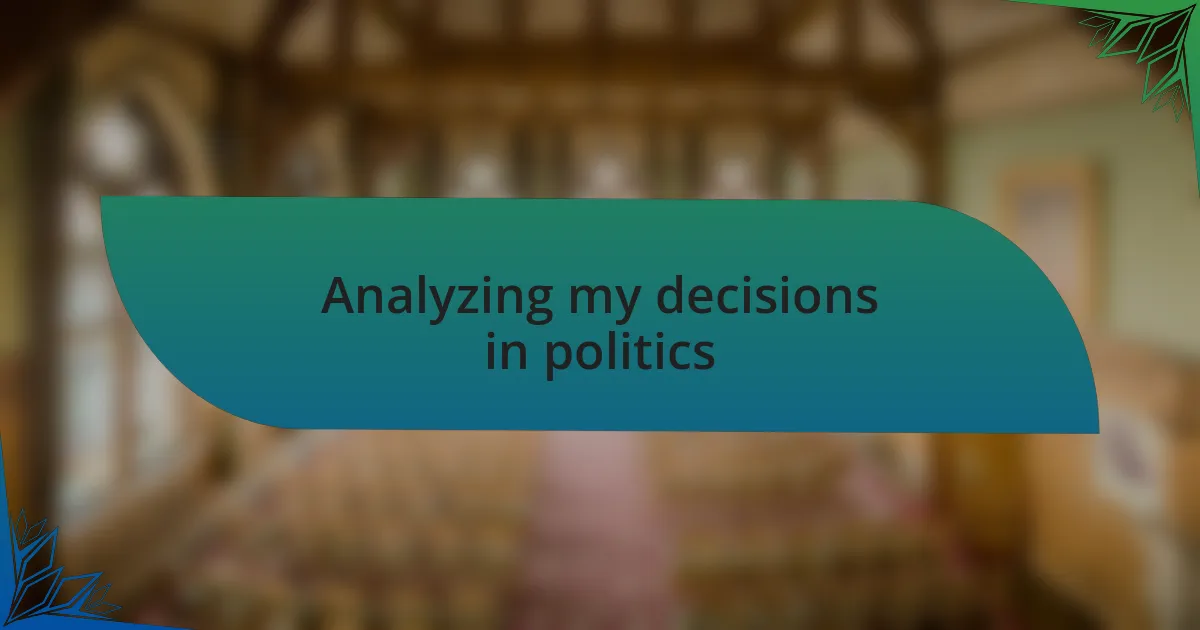
Analyzing my decisions in politics
When I look back on my political decisions, I often find myself weighing the balance between data and instinct. There was a time when I chose to support a particular candidate based on extensive research, only to realize later that my gut had a different perspective. It makes me question: how often do we let numbers overshadow our inherent understanding of the electorate’s sentiments?
Sometimes, the rush of a political moment calls for quick thinking. During a heated town hall meeting, I had to make an on-the-spot decision about a controversial issue. The immediate feedback from the audience was visceral; their reactions were a stark reminder of how closely intertwined emotion and politics can be. In that moment, I felt the weight of responsibility but also the exhilarating rush of being part of something meaningful.
Reflecting on the collaborative decision-making experiences I’ve had, I can’t help but emphasize the magic that happens when diverse voices come together. I recall organizing a workshop where community members shared their distinct viewpoints on urban zoning changes. The richness of those discussions not only opened my eyes to different narratives but also confirmed my belief that democracy thrives when we come together. Isn’t it fascinating how dialogue can transform perceptions and lead to more informed choices?
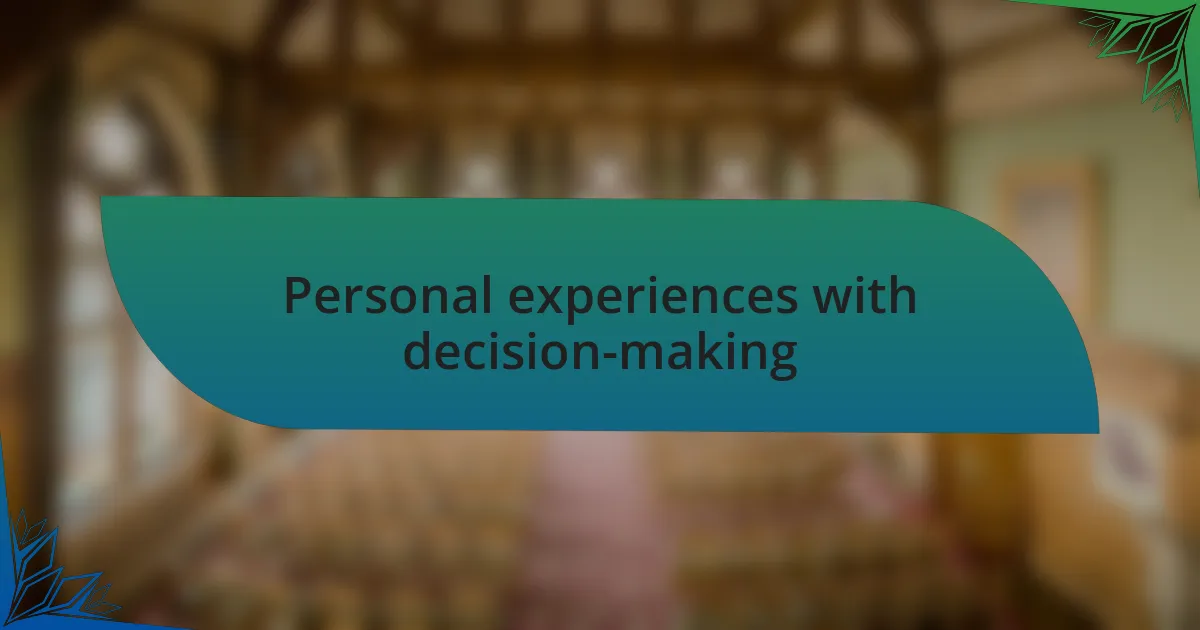
Personal experiences with decision-making
When I faced a pivotal decision about endorsing a policy change in my local community, my instincts were torn. I vividly remember sitting at my kitchen table, surrounded by research papers, feeling both overwhelmed and compelled. I asked myself: Should I prioritize what the data suggested or trust the voices of my neighbors who shared heartfelt stories of their lived experiences? Ultimately, I chose to listen to those stories, which ended up fostering community trust in a way that data alone never could.
In another instance, I was part of a committee tasked with addressing youth engagement in politics. During our meetings, we often found ourselves at an impasse, with various viewpoints clashing. One day, an unexpected outburst from a young participant shifted everything. Her passion brought tears to her eyes when she spoke about feeling unheard. It was a powerful reminder that the human element in decision-making isn’t just a facet but a fundamental cornerstone. How many decisions have we made without truly hearing those most affected?
Decision-making in politics isn’t solely about strategy; it’s also deeply personal. I recall grappling with the decision of where to focus my advocacy efforts after hearing testimonials from families impacted by a recent policy. Guided by emotional resonance, I pivoted my priorities, realizing that connecting with the human experience shifted my approach. Isn’t it interesting how a single narrative can change the trajectory of our actions and ultimately shape the world around us?
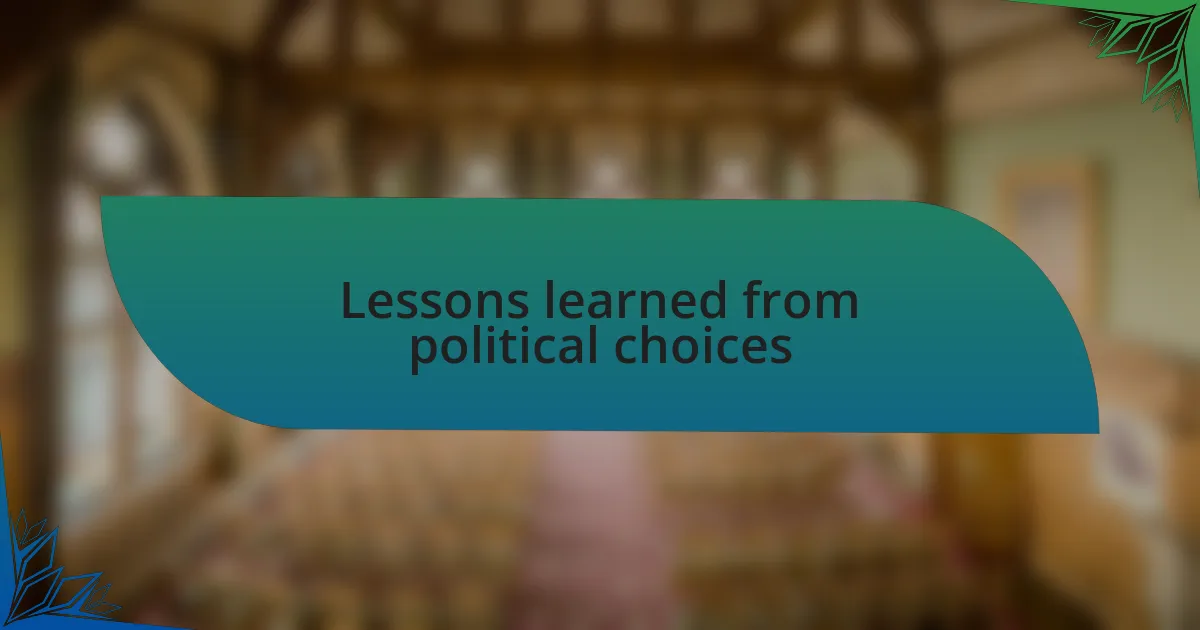
Lessons learned from political choices
Lessons learned from political choices often emerge from unexpected situations. I recall a time when a seemingly straightforward decision became a learning moment. While drafting a proposal for environmental regulations, I underestimated the impact of local stakeholders. A well-organized group of concerned citizens had gathered a wealth of information and perspectives that surprised me. Their insights illustrated the importance of collaboration and trust-building in creating effective policies.
Another experience stands out in my mind when I had to decide whether to pursue a contentious issue in our town hall meetings. I hesitated, fearing backlash, but ultimately found the courage to raise the question. To my surprise, the conversation transformed into a dynamic exchange where participants felt empowered to share their divergent views. It was a powerful lesson about the necessity of open dialogue in facilitating democratic engagement. How often do we shy away from difficult topics, fearing the discomfort they may bring?
Furthermore, I learned that the ramifications of political choices extend far beyond immediate outcomes. During a heated debate over budget allocations, I noticed how decisions affected the morale within our community. For every choice, there were stories—stories of those who felt uplifted or sidelined. Reflecting on this dynamic led me to understand that every political decision is an opportunity to shape not just policy but the fabric of community relationships. Isn’t it fascinating how our choices ripple through the lives of others in ways we may not initially see?